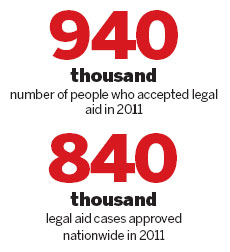Migrant workers have become the main beneficiaries of a legal aid policy adopted last year, said a senior official from the Ministry of Justice.
Of the 940,000 people who accepted legal aid in 2011, 310,000 were migrant workers, Sun Jianying, director of the legal aid department under the Ministry of Justice, told China Daily in an exclusive interview.
"China is transforming its political system and economic growth model, which inevitably stirs up various kinds of social conflicts, putting the interests of vulnerable groups at stake," said Sun.
|
 |
Others large groups that benefit include farmers, elderly people and minors, she said.
The ministry is expanding the scope of people who can receive legal aid and has sent more experienced lawyers to poor cities and counties in the western region to provide legal assistance, Sun said, all of which contributed to the sharp increase of legal aid cases.
Also, people with very low incomes are eligible for free legal aid.
"To most vulnerable groups, legal aid is considered an effective channel - maybe their only hope to safeguard their interests and legitimate rights," said Li Guifang, deputy director of the criminal defense committee under the All China Lawyers' Association.
"In China, many victims are poor, and they can't afford to hire a lawyer for a lawsuit. But if small disputes can't be solved in a timely manner, they will probably lead to big social conflicts or mass incidents," he said.
Since 2009, the number of legal aid cases handled across the country has increased an average of 14.8 percent a year.
In 2011, a total of 840,000 legal aid cases were approved nationwide, providing aid to 940,000 people, Sun said.
Among those cases, more than 726,000 were civil ones, with most related to payment and employment disputes, marriage and domestic affairs, as well as traffic accidents.
Fewer than 114,000 were criminal cases, she said.
In practice, cases involving land acquisition and house demolition, company restructuring, education and medical treatment, pollution, as well as food and drug safety have not been included in the scope of many local legal aid agencies.
Moreover, the working mechanism for legal aid, including low-income evaluation standards, funding and supervision, should be improved, Sun said.
This year, the ministry plans to invest at least 300 million yuan ($47 million) to support the legal aid program, a 50 percent increase over 2011, and it also plans to increase lawyers' subsidies for legal assistance by 20 percent, Sun said.
At present, a lawyer only receives an average of 1,100 yuan for a civil case, and 900 yuan for a criminal case.
"Lawyers are still facing many difficulties in providing legal assistance to criminal suspects," said Xu Litong, director of the Jiangsu provincial legal aid center.
"Once the criminals are detained, their lawyers have no means to meet or get in contact with them within 48 hours. Meanwhile, the police won't tell the lawyers about the progress of the investigation, which seriously violates the suspects' legal rights," he said, adding he hopes the newly revised Criminal Procedure Law will help improve the situation and further protect the human rights of the suspects.
